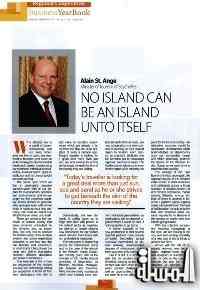
Special Edition Business Magazine – Business Year Book 2015 publishes report by Alain St.Ange, Minister of Tourism of Seychelles
ATP- arab tourism portal- Seychelles economic perspective: Today, no island can be an island unto itself says Alain St.Ange, the Seychelles Minister responsible for Tourism and Culture to the Business Magazine of Mauritius for their Special Edition of the Business Year Book 2015..
Today, we already live in a world of super-connectivity and our lives, wherever we live or work, are destined to become ever more so as technology hurtles forward at breakneck speed, transforming our existence, individual and collective, as never before. Quite literally, our world is changing right beneath our feet.
.jpg) The planet upon which we live is undergoing massive transformation with all that implies for its economics, societies and environments and increasingly we find ourselves reaching across borders to generate new synergies even with former rivals in response to a new currency: not even an island can afford to be an island unto itself.
The planet upon which we live is undergoing massive transformation with all that implies for its economics, societies and environments and increasingly we find ourselves reaching across borders to generate new synergies even with former rivals in response to a new currency: not even an island can afford to be an island unto itself.
There are precious few domains of human activity that have remained untouched by this dynamic and, as examples, one only has to conduct the briefest study of the modern aviation and space exploration industries to see how true this has become and, elsewhere, to what extent it has blurred the once very distinct boundaries between different disciplines and areas of endeavour.
One example of this is how the exigencies of the tourism industry are increasingly calling the respective cultures of tourism destinations into play to add value to vacation experiences which are already a far cry from the ‘flop & drop’ holidays of even a decade ago. Today’s traveller is looking for a great deal more than just sun, sea and sand as he or she strives to get beneath the skin of the country they are visiting.
Domestically, this new dynamic is calling upon us to forge new links with people in the cultural sector as, together, we attempt to create enticing new landscapes for our visitors which will send them home with rich and indelible memories.

The very same is happening across the international arena and, in the case of the islands of the western Indian Ocean, has recently given birth to the concept of the Vanilla Islands consisting of Seychelles, La Reunion, Mauritius, Madagascar, Mayotte and Comoros. Here, we see clearly how islands which may formerly have considered each other as rivals, are now cooperating in a new concept of opening up their shared region to tourism, each placing their country’s attributes into the common pot to encourage regional, inter-island travel. The Vanilla Islands allows us to market the region while retaining our own individual personalities as destinations and to proceed together where it would be hard, if not impossible, to go alone.
A further example of this new partnership is that several regional partners have already co-hosted Seychelles’ annual ‘Carnaval International de Victoria’ showing unprecedented degrees of collaboration where there was once only rivalry.
Like it or not, it is incontestable that our modern world is shrinking, bringing us into closer contact with each other in ways which present challenges as well as opportunities. Many of the latter lie in the rolling out of plans for the Blue Economy – an alternative economic model for sustainable development which acknowledges our dependency upon our surrounding ocean and which potentially partners the islands of the western Indian Ocean as we each strive to make this idea a reality.
The concept of the Blue Economy invites, once again, the regional players of the western Indian Ocean to share resources and collaborate across a broad spectrum of activities: tourism, oil and mineral exploration, marine security, fisheries, energy, etc. Each of these is destined to become a platform where regional states can benefit from the fruits of collaboration not only to further their own individual plans but, more importantly, to become in the process so much more than islands going it alone.
With this collective perspective knocking increasingly at the door, we are looking at the very real and exciting possibility of a new way of doing things to achieve our aims.
Armed with the raft of constantly evolving new technologies, regional team spirit is well-equipped to succeed as it calls not only on the combined strength but also the diverse attributes of member states to create the win-win situations necessary for victory…and perhaps even survival.








